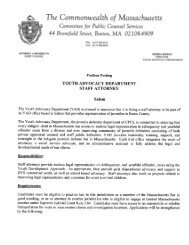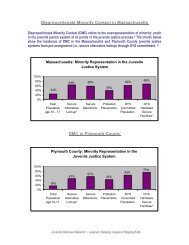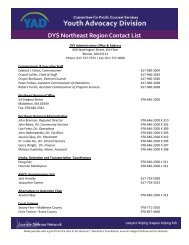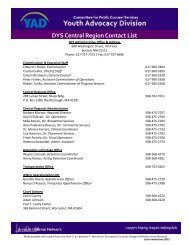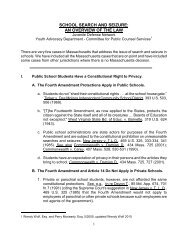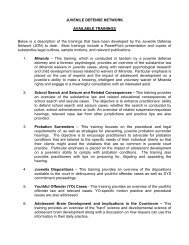States rethink 'adult time for adult crime' - the Youth Advocacy Division
States rethink 'adult time for adult crime' - the Youth Advocacy Division
States rethink 'adult time for adult crime' - the Youth Advocacy Division
Create successful ePaper yourself
Turn your PDF publications into a flip-book with our unique Google optimized e-Paper software.
concentration camp or Guantánamo, that would be bad, but in an occupation<br />
situation, to mark someone down <strong>for</strong> fur<strong>the</strong>r surveillance, that might be<br />
appropriate.”<br />
Paul Root Wolpe, who teaches social psychiatry and psychiatric ethics at <strong>the</strong><br />
University of Pennsylvania School of Medicine, says he anticipates that<br />
neuroscience predictions will move beyond <strong>the</strong> courtroom and will be used to<br />
make predictions about citizens in all walks of life.<br />
“Will we use brain imaging to track kids in school because we’ve discovered that<br />
certain brain function or morphology suggests aptitude” he asks. “I work <strong>for</strong><br />
NASA, and imagine how helpful it might be <strong>for</strong> NASA if it could scan your brain<br />
to discover whe<strong>the</strong>r you have a good enough spatial sense to be a pilot.” Wolpe<br />
says that brain imaging might eventually be used to decide if someone is a worthy<br />
foster or adoptive parent — a history of major depression and cocaine abuse can<br />
leave telltale signs on <strong>the</strong> brain, <strong>for</strong> example, and future studies might find parts<br />
of <strong>the</strong> brain that correspond to nurturing and caring.<br />
The idea of holding people accountable <strong>for</strong> <strong>the</strong>ir predispositions ra<strong>the</strong>r than <strong>the</strong>ir<br />
actions poses a challenge to one of <strong>the</strong> central principles of Anglo-American<br />
jurisprudence: namely, that people are responsible <strong>for</strong> <strong>the</strong>ir behavior, not <strong>the</strong>ir<br />
proclivities — <strong>for</strong> what <strong>the</strong>y do, not what <strong>the</strong>y think. “We’re going to have to make<br />
a decision about <strong>the</strong> skull as a privacy domain,” Wolpe says. Indeed, Wolpe<br />
serves on <strong>the</strong> board of an organization called <strong>the</strong> Center <strong>for</strong> Cognitive Liberty and<br />
Ethics, a group of neuroscientists, legal scholars and privacy advocates<br />
“dedicated to protecting and advancing freedom of thought in <strong>the</strong> modern world<br />
of accelerating neurotechnologies.”<br />
There may be similar “cognitive liberty” battles over ef<strong>for</strong>ts to repair or enhance<br />
broken brains. A remarkable technique called transcranial magnetic stimulation,<br />
<strong>for</strong> example, has been used to stimulate or inhibit specific regions of <strong>the</strong> brain. It<br />
can temporarily alter how we think and feel. Using T.M.S., Ernst Fehr and Daria<br />
Knoch of <strong>the</strong> University of Zurich temporarily disrupted each side of <strong>the</strong><br />
dorsolateral prefrontal cortex in test subjects. They asked <strong>the</strong>ir subjects to<br />
participate in an experiment that economists call <strong>the</strong> ultimatum game. One<br />
person is given $20 and told to divide it with a partner. If <strong>the</strong> partner rejects <strong>the</strong>




